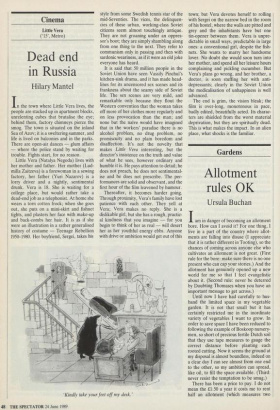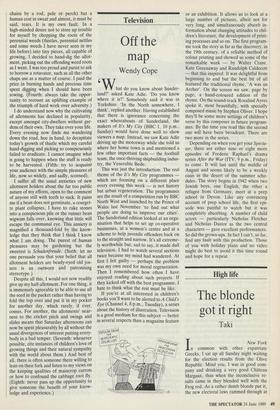Gardens
Allotment rules OK
Ursula Buchan
Iam in danger of becoming an allotment bore. How can I avoid it? For one thing, I live in a part of the country where allot- ments are falling into disuse (I appreciate that it is rather different in Tooting), so the chances of coming across anyone else who cultivates an allotment is not great. (First rule for the bore: make sure there is no one present who can cap your stories.) And the allotment has genuinely opened up a new world for me so that I feel evangelistic about it. (Second rule: never be deterred by Doubting Thomases when you have an important message to get across.) Until now I have had carefully to hus- band the limited space in my vegetable garden. It is not that small but it has certainly restricted me in the inordinate variety of vegetables I want to grow. In order to save space I have been reduced to following the example of Boskoop nursery- men, so short of precious fertile Dutch soil that they use tape measures to gauge the correct distance before planting each rooted cutting. Now it seems the ground at my disposal is almost boundless, indeed on a clear day I can see almost from one end to the other, so my ambition can spread, like oil, to fill the space available. (Third: never resist the temptation to be smug.) There has been a price to pay. I do not mean the £1.50 a year it costs me to rent half an allotment (which measures two chains by a rod, pole or perch) but a human cost in sweat and almost, it must be said, tears. It is my own fault. In a high-minded desire not to store up trouble for myself by chopping the roots of the perennial weeds (thistles, perennial nettles and some weeds I have never seen in my life before) into tiny pieces, all capable of growing, I decided to hand-dig the allot- ment, picking out the offending weed roots as I went. I was too proud and purist to ask to borrow a rotavator, such as all the other chaps use as a matter of course. I paid the price in burning hands and precious time spent digging when I should have been sowing. (Fourth: always take the oppor- tunity to recount an uplifting example of the triumph of hard work over adversity.) I do understand now why the cultivating of allotments has declined in popularity, except amongst city-dwellers without gar- dens of their own. They take over your life. Every evening now finds me wandering down the road, hoe in hand, to decapitate today's growth of thistle which my careful hand-digging and picking so conspicuously failed to eradicate. I cannot imagine what is going to happen when the stuff is ready to be harvested. (Fifth: try to acquaint your audience with the simple pleasures of life, now so widely, and sadly, scorned).
I suffer all the usual anxieties of new allotment holders about the far too public nature of my efforts, open to the comment of anyone still with teeth to suck. It pains me if a bean does not germinate, a courget- te plant collapses, I have to rake stones into a conspicuous pile or the runner bean wigwam falls over, knowing that little will escape the communal eye. This anxiety is magnified a thousand-fold by the know- ledge that they think that I think I know what I am doing. The purest of human pleasures may be gardening but the sweetest is Schadenfreude. (Sixth: let no one persuade you that your belief that all allotment holders are beady-eyed old jos- sers is an outworn and patronising stereotype.) Despite all this, I would not now readily give up my half-allotment. For one thing, it is immensely agreeable to be able to use all the seed in the packet rather than having to fold the top over and put it in my pocket for another day, which rarely, if ever, comes. For another, the allotments' near- ness to the cricket pitch and swings and slides means that Saturday afternoons can now be spent pleasurably by all without the usual divergences of interest putting every- body in a bad temper. (Seventh: whenever possible, cite instances of children's love of growing things and their natural sympathy with the world about them.) And best of all, there is often someone there willing to lean on their fork and listen to my views on the keeping qualities of maincrop carrots or how to confound the cabbage root fly. (Eighth: never pass up the opportunity to give someone the benefit of your know- ledge and experience.)











































































 Previous page
Previous page